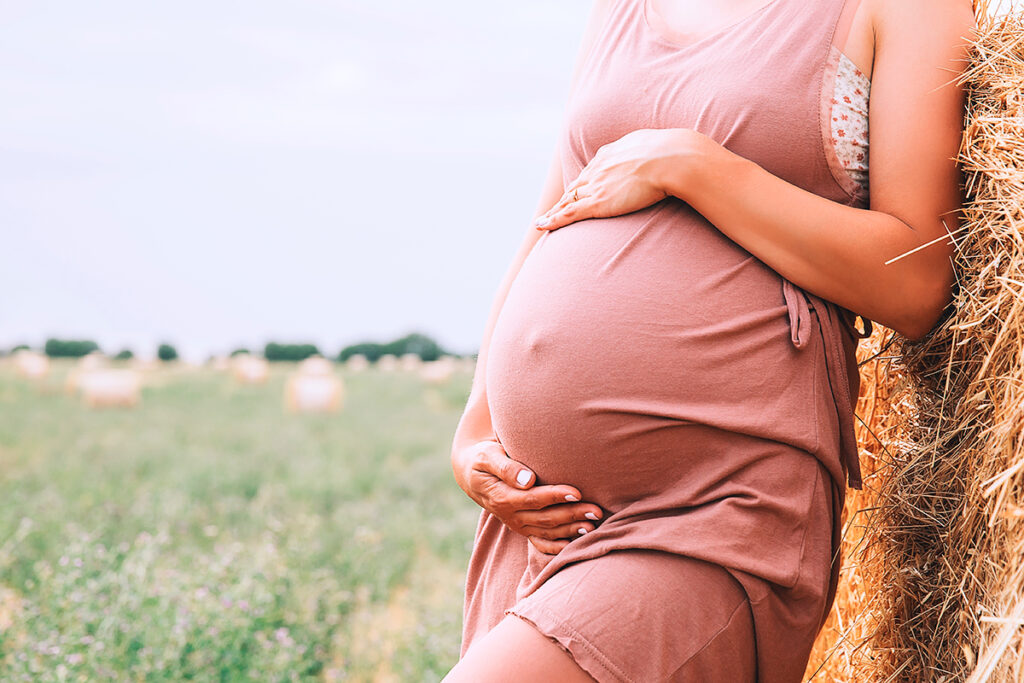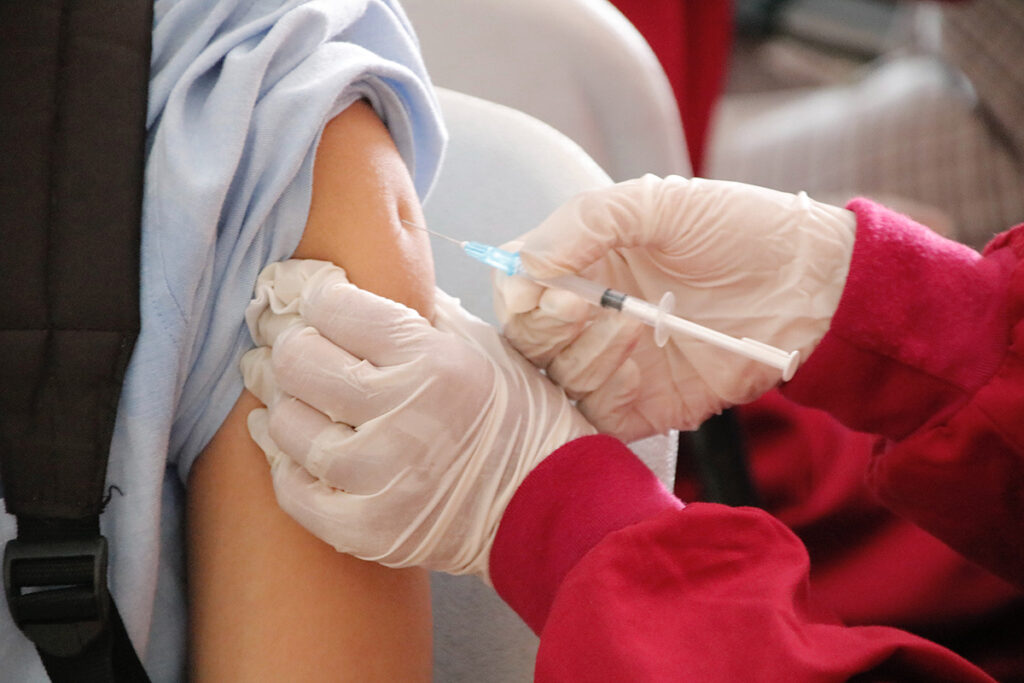Content
- Where did the myth that the coronavirus vaccine causes infertility come from?
- Scientific facts say: antibodies to SARS-CoV-2 do not respond to placental protein
- The COVID-19 vaccine does not cause infertility
- COVID-19 vaccine does not reduce male fertility
- SARS-CoV-2 infection reduces sperm and egg quality
- Vaccination against coronavirus does not increase the risk of miscarriage and stillbirth
- Conclusions
- Sources
Some women refrain from getting the COVID-19 vaccine for fear that it could affect their fertility or increase their risk of miscarriage. However, research shows that COVID-19 vaccines do not affect the ability to get pregnant, do not increase the likelihood of miscarriage, and are safe and effective during pregnancy.
Where Did The Myth that The Coronavirus Vaccine Causes Infertility Come From?
Former Pfizer CEO Michael Yeedon and German physician and politician Wolfgang Wodarg co-sponsored a petition in December 2020 urging the European drug regulator to stop trials of the Pfizer COVID-19 vaccine because it could cause infertility.
The petition acknowledged the lack of scientific evidence to support this claim. However, it has been suggested that since the placental protein syncytin-1 has some similarity to the SARS-CoV-2 spike protein, antibodies that block the coronavirus spike protein can also attach to the placenta. By the time the petition was denied entirely by the scientific community and rejected by regulators, it was already too late. The petition spread across social media.
Scientific Facts Say: Antibodies to SARS-Cov-2 Do Not Respond to Placental Protein
Viral and placental proteins are not similar enough for antibodies to the SARS-CoV-2 spike protein bind to the placental protein syncytin-1. Laboratory studies confirm this:
- Scientists from the Yong Lu Ling School of Medicine at the National University of Singapore investigated the cross-reactivity of antibodies against the SARS-CoV-2 spike protein with syncytin-1. For the study, the scientists used cells that stably express syncytin-1 on the surface and 10 monoclonal antibodies with confirmed reactivity to the SARS-CoV-2 spike protein, which were used to treat patients with COVID-19. None of the 10 monoclonal antibodies tested cross-reacted with syncytin-1.
To determine if vaccination against SARS-CoV-2 leads to the production of antibodies against syncytin-1, the scientists analyzed plasma from 66 people collected at three different time points: the first dose, 21 days after the first dose, and 2 months after the second dose. The scientists did not find cross-reactivity with syncytin-1 in the plasma of vaccinated individuals in any of the samples, despite the increase in antibody titers.
To determine if SARS-CoV-2 infection is causing the production of antibodies against syncytin-1, the scientists tested plasma from 37 COVID-19 patients collected 28 days after recovery. No antibodies to syncytin-1 were detected in the plasma of these convalescent patients.
The research is published in the Nature journal.
- In another study, Singaporean scientists analyzed antibodies at early (1-4 days) and late (4-7 weeks) time points after vaccination with the first dose of Pfizer-BioNTech. The study involved 15 people, including 5 lactating women and 2 women accidentally vaccinated in early pregnancy. The vaccine messenger RNA was detected in plasma 1-4 days after the first dose but not after 4-5 weeks. No vaccine messenger RNA was found in breast milk samples collected 0-7 days after vaccination. 4 weeks after the first dose of the vaccine, all participants demonstrated potent neutralizing activity against SARS-CoV-2, including two pregnant women. No one had antibodies against syncytin-1 at any time after vaccination.
The research was published on the medRxiv preprint server.
Neither the vaccine nor the natural infection with SARS-CoV-2 causes the production of antibodies to the placental protein syncytin-1. Antibodies to SARS-CoV-2 do not respond to syncytin-1.
COVID-19 Vaccine Does Not Cause Infertility
Pregnant women were not included in the COVID-19 vaccine trials, and test participants were asked to avoid pregnancy. However, some participants got pregnant by accident. Accidental pregnancies occurred equally in vaccinated and unvaccinated groups. This fact suggests that vaccination did not prevent pregnancy. The pregnant participants have a normal pregnancy. Data on these cases:
- Fertility rates and delivery outcomes after AstraZeneca vaccination. 121 of the 9,755 participants in the vaccine trials reported pregnancy during the tests. All pregnancies that occurred after vaccination were recorded and observed within 3 months after the child’s birth. Scientists analyzed the fertility results of 93 pregnant women: 50 people were vaccinated with AstraZeneca, 43 – a control group (placebo). The analysis of pregnancy outcomes included 107 women: 72 – vaccinated with AstraZeneca, 35 – control group. Vaccination did not affect fertility. In addition, compared with women from the control group, women vaccinated before pregnancy did not have an increased risk of miscarriage and stillbirth. Details of the study are published in The Lancet.
- Safety indicators of the Moderna vaccine. During the vaccine trials, 13 pregnancies were registered: 6 vaccines, 7 placebos. The vaccine, administered before and during pregnancy at a dose of 100 micrograms, had no adverse effect on women’s reproductive function, fetal/embryo development, or postnatal development, except for skeletal changes, which are common and usually resolved postnatally without intervention. The data is published on the website of the US Food and Drug Administration.
After the introduction of vaccines, scientists collected additional data on the effect of vaccines on fertility. In patients undergoing IVF, vaccination against COVID-19 does not affect ovarian function, egg quality, fertilization, or the clinical frequency of pregnancy:
- SARS-CoV-2 infection or Pfizer-BioNTech vaccination does not disrupt ovarian follicular function. Exposure to the SARS-CoV-2 virus or vaccine mRNA leads to the rapid formation of IgG antibodies in the follicular fluid, and the concentration correlates with serum concentrations. Neither the infection, vaccine, or immune response to them harmed the function of the ovarian follicle. The assessment of follicular steroidogenesis in three groups of participants: vaccinated, who had SARS-CoV-2 infection, and the control group showed similar estrogen and progesterone production levels. The only difference is a lower progesterone level on the day of vaccination. However, there was no difference in either serum or follicular fluid on the day of egg collection, so it is unlikely that this difference plays a significant role. Evaluation of the follicle response to the LH/HCG trigger showed a similar normal reaction in all participants. The study is published on the medRxiv preprint server.
- The Pfizer-BioNTech COVID-19 vaccine has no adverse effect on women’s fertility. The study involved 297 patients undergoing IVF. Most of them (56%) have completed the administration of two doses of the vaccine, 13% of women have had SARS-CoV-2 infection in the past, and 87% met the vaccination criteria. In this subset of women eligible for vaccination, 64% completed two doses of the vaccine, 2% received only one dose, and 34% chose not to be vaccinated against COVID-19. The scientists analyzed the number of selected eggs, the number of mature eggs, and the fertilization rate. The results did not differ significantly before and after vaccination. There were also no significant differences between the number of embryos with a high degree of fragmentation and the number of excellent and superior quality embryos before and after vaccination. The assessment of the frequency of pregnancy was carried out on 15 women from the sample. The number and percentage of clinical pregnancies did not differ significantly between the groups before and after vaccination. The study is published on the medRxiv preprint server.
- Antibodies to the spike protein SARS-CoV-2 as a result of vaccination or infection do not cause infertility. If we assume that the spike protein SARS-CoV-2 is similar to the placental protein syncytin-1, then the hypothetical cross-reactivity of antibodies will damage the developing trophoblast, preventing embryo implantation. If this is the case, this cross-reactivity will cause lifelong infertility due to vaccination and natural disease. Previous laboratory studies have refuted the existence of cross-reactivity of antibodies. In this study, scientists analyzed how antibodies to the coronavirus spike protein affect the implantation of an embryo during IVF. The earliest confirmation of embryo implantation is detecting elevated HCG levels in the mother’s blood serum. There were no differences in serum hCG, the frequency of stable implantation, clinical manifestations, and duration of pregnancy between the groups of vaccinated patients who had SARS-CoV-2 infection and the control group. Details of the study are published in the Science Direct
- mRNA vaccines from SARS-CoV-2 do not affect the performance of patients during IVF. 36 couples continued IVF treatment 7-85 days after vaccination against SARS-CoV-2 (Pfizer-BioNTech). There were no differences between IVF cycles in ovarian stimulation and embryological variables before and after vaccination. There were no differences in the number of selected and mature eggs, fertilization rate, and several embryos of the highest quality or sperm tests. None of the patients became pregnant in the IVF cycle before vaccination, while in the cycle after vaccination, 3 pregnancies were registered in 10 patients who underwent embryo transfer. The details of the study are published in the BioMed Central
The following facts also confirm that coronavirus vaccination does not interfere with normal pregnancy:
- Preliminary data on the safety of Pfizer and Moderna vaccines against COVID-19 for pregnant women. The Centers for Disease Control and Prevention of the USA monitored the condition of vaccinated people using a smartphone (V-safe program). The program sends participants surveys that assess adverse reactions and health status during the vaccination period and within 12 months after the second dose of the vaccine. Women who received the vaccine during pregnancy or became pregnant later were included in the register of pregnant women. After delivery, the infants were monitored for 3 months. 4,804 women reported pregnancy after vaccination. Details of the study are published in The New England Journal of Medicine.
- According to the HealthPartners Institute of Medical Education in the USA, from December 14, 2020, to July 31, 2021, 10,178 women received at least one dose of the vaccine, and 6,792 women who received both doses reported pregnancy.
- According to the Public Health Agency of Canada, between December 14, 2020, and May 31, 2021, out of 30,892 pregnant women who received at least one dose of the vaccine during pregnancy, 222 women received the first dose before pregnancy, and 273 women received both doses before pregnancy.
COVID-19 vaccines do not stay in the body for long. Their task is to trigger a protective response of the immune system. The body breaks down the components of the vaccine within a few hours. Vaccination against COVID-19 does not affect the ability to have children. The vaccine does not interfere with ovarian function and does not reduce the chances of getting pregnant.
COVID-19 Vaccine Does Not Reduce Male Fertility
Studies of sperm quality before and after vaccination have shown that the vaccine does not cause male infertility:
- A study of IVF results in 36 couples who received both doses of the COVID-19 vaccine showed that vaccination does not affect sperm volume, concentration, and motility of sperm.
- Another study also showed that the Pfizer-BioNTech COVID-19 vaccine does not worsen sperm parameters. The study involved 43 vaccinated men who underwent IVF and did not have male infertility. Before and after vaccination, none of the parameters of the spermogram differed significantly.
- Scientists of the Department of Urology at the University of Miami in the USA evaluated the parameters of sperm cells before and after the introduction of Pfizer-BioNTech or Moderna vaccines. The study involved 45 men aged 18 to 50 years without fertility problems. Those who had symptoms of COVID-19 or tested positive for 90 days were excluded from the study. Semen samples were provided before receiving the first dose of the vaccine and approximately 70 days after the second. After the second dose of the vaccine, the volume of sperm, the average concentration, and the motility of spermatozoa increased significantly. The magnitude of the change was within the normal individual variations. None of the vaccinated patients got azoospermia (absence of spermatozoa in the seminal fluid). Details of the study are published in The Journal of the American Medical Association.
Vaccination against coronavirus does not affect the qualitative and quantitative indicators of seminal fluid and its spermatozoa.
SARS-Cov-2 Infection Reduces The Quality of Sperm and Female Eggs
Since vaccines contain mRNA and not a live virus, it is unlikely to affect sperm parameters. However, SARS-CoV-2 infection reduces the quality of sperm and can reduce the rate of eggs.
COVID-19 activates the release of large amounts of pro-inflammatory cytokines and can cause and maintain systemic inflammation. Possible consequences of COVID-19 are the development of abnormal eggs and spermatozoa, followed by low-quality embryos.
Infection with SARS-CoV-2 can lead to problems with male fertility. Scientists at the University of Stellenbosch in South Africa reviewed 802 articles on the effect of coronaviruses on male fertility, among which 307 studies were devoted to SARS-CoV-2•
- Most studies reported the absence of SARS-CoV-2 in seminal fluid, prostate secretions, and testicular tissues.
- COVID-19 causes testicular damage and inflammatory infiltration.
- If infected with SARS-CoV-2, viral orchitis (testicular inflammation) may occur, as patients experience discomfort in the scrotum.
- COVID-19 increases the number of sperm with DNA fragmentation.
Details of the study are published in the journal Science Direct.
Coronavirus Vaccination Does Not Increase The Risk of Miscarriage and Stillbirth
The rate of adverse events at birth. The U.S. Centers for Disease Control and Prevention monitors the safety of new COVID-19 vaccines in several ways. One of them is watching using the V-safe program. From December 14, 2020, to February 28, 2021, 3,958 women who received the vaccine were included in the V-safe pregnancy register. By March 30, 827 of these women had completed pregnancy, 712 of them had given birth to live children. The incidence of adverse events at birth was the same in those vaccinated against COVID-19 during pregnancy as in the entire pregnant population. Details of the study are published in The New England Journal of Medicine.
Risk of miscarriage. In the same cohort, scientists additionally studied the frequency of miscarriages. The study involved 2,456 people who were vaccinated before 20 weeks of pregnancy. The participants were monitored for up to 20 weeks. The risk of spontaneous abortion after vaccination against COVID-19 before conception or during pregnancy is the same as the expected risk of spontaneous abortion in all pregnant women. Vaccination did not increase the risk of miscarriage. Details of the study are published in The New England Journal of Medicine.
The risk of premature birth, small baby size for gestational age, newborn admission to the intensive care unit, neonatal and infant death. Another study in the same cohort analyzes live births. By September 13, 2021, 1,634 children were born. The frequency of adverse events at birth remained the same as in the general population. The frequency and types of congenital disabilities are also consistent with data on the general population. Details of the study are published on the website of the US Centers for Disease Control and Prevention.
Vaccination against COVID-19 is not associated with miscarriages and stillbirths. This is confirmed by research:
- Between December 14, 2020 and July 31, 2021, 11,300 women who received the COVID-19 vaccine during pregnancy gave birth. Of these, 26 stillbirths. The risk of complications associated with stillbirth: actual node, tight umbilical cord, placenta, placental abruption, chorioamnionitis, congenital cytomegalovirus, multiple pregnancies with complications, concomitant pathology in the mother (hypertension, diabetes) – was the same as in the general population. Details of the study are published on the website of the US Centers for Disease Control and Prevention.
- A study involving 30,892 people who received the vaccine during pregnancy in Ontario also found no increased risk of stillbirth and premature birth among 3,236 who gave birth. Vaccination did not increase the number of children who were smaller than expected for their gestational age.
- An Israeli study involving 390 pregnant women showed no increased risk of stillbirth, premature birth, or a small baby size for their gestational age among the 57 who gave birth during the follow-up period. There were no miscarriages among the study participants. The details of the study are published in the Obstetrics & Gynecology
- In three more studies, scientists compared the results at the birth of children from vaccinated pregnant women and unvaccinated ones. All of them did not reveal an increased risk of adverse outcomes at birth associated with vaccination. One study examined the frequency of miscarriages. There was no increased risk of miscarriage related to vaccination.
- Scientists investigated cases of miscarriages among 105,446 pregnant women. The researchers analyzed the probability of receiving the COVID-19 vaccine 28 days before miscarriage compared with acquiring the COVID-19 vaccine 28 days before the exact date for ongoing pregnancies. Miscarriages did not have an increased chance of exposure to COVID-19 vaccination in the previous 28 days compared to an ongoing pregnancy. Details of the study are published in The Journal of the American Medical Association.
- A Norwegian study of 18,950 pregnancies found that people who had a miscarriage were no more likely to receive the COVID-19 vaccine in the previous three or five weeks than those who did not have a miscarriage. Details of the study are published in The New England Journal of Medicine.
Conclusions
Antibodies to the spike protein SARS-CoV-2 do not react to the placental protein syncytin-1. It refutes the myth that the coronavirus vaccine causes infertility.
The vaccine does not affect fertility. Data on accidental pregnancies confirm this during clinical trials of vaccines and the results of patients undergoing IVF after vaccination.
Vaccination against COVID-19 also does not affect male fertility. However, SARS-CoV-2 infection reduces the quality of sperm.
The vaccine does not increase the risk of miscarriage. However, SARS-CoV-2 infection can cause severe illness in pregnant women. Read more about the effect of COVID-19 on pregnancy in the review:
- Pregnancy and COVID-19: pregnant women and those recently given birth are at risk for coronavirus infection.
Vaccination during pregnancy and breastfeeding protects the mother from severe illness and forms temporary passive immunity to coronavirus in the infant – the child receives protective antibodies. Read more about this in the research reviews:
- Vaccination of pregnant women: the newborn receives protective maternal antibodies to the coronavirus. Antibodies to SARS-CoV-2 are more effectively transmitted during vaccination than with natural infection.
- Vaccination against coronavirus during breastfeeding. Antibodies in breast milk can protect babies from COVID-19.
Useful article, necessary information? Share it!
Someone will also find it useful and necessary:
Sources
- No crossreactivity of anti-SARS-CoV-2 spike protein antibodies with Syncytin-1
- Addressing anti-syncytin antibody levels, and fertility and breastfeeding concerns, following BNT162B2 COVID-19 mRNA vaccination
- Fertility rates and birth outcomes after ChAdOx1 nCoV-19 (AZD1222) vaccination
- Vaccines and Related Biological Products Advisory Committee Meeting. December 17, 2020
- Ovarian follicular function is not altered by SARS-Cov-2 infection or BNT162b2 mRNA Covid-19 vaccination
- Stopping the misinformation: BNT162b2 COVID-19 vaccine has no negative effect on women’s fertility
- SARS-CoV-2 spike protein seropositivity from vaccination or infection does not cause sterility
- Does mRNA SARS-CoV-2 vaccine influence patients’ performance during IVF-ET cycle?
- Preliminary Findings of mRNA Covid-19 Vaccine Safety in Pregnant Persons
- Safety of COVID-19 Vaccination in Pregnancy, Interim Data from the Vaccine Safety Datalink
- COVID-19 Vaccination During Pregnancy in Ontario
- Does mRNA SARS-CoV-2 vaccine influence patients’ performance during IVF-ET cycle?
- BNT162b2 mRNA Covid-19 vaccine does not impair sperm parameters
- Sperm Parameters Before and After COVID-19 mRNA Vaccination
- SARS-COV-2 (Covid-19) and male fertility: Where are we?
- Receipt of mRNA Covid-19 Vaccines and Risk of Spontaneous Abortion
- COVID-19 vaccine safety in pregnancy: Updates from the v-safe COVID-19 vaccine pregnancy registry
- No, COVID-19 vaccines don’t affect women’s fertility
- Short-term outcome of pregnant women vaccinated with BNT162b2 mRNA COVID-19 vaccine
- Association Between BNT162b2 Vaccination and Incidence of SARS-CoV-2 Infection in Pregnant Women
- Pregnancy and birth outcomes after SARS-CoV-2 vaccination in pregnancy
- COVID-19 vaccination during pregnancy: coverage and safety
- Spontaneous Abortion Following COVID-19 Vaccination During Pregnancy
- Covid-19 Vaccination during Pregnancy and First-Trimester Miscarriage



